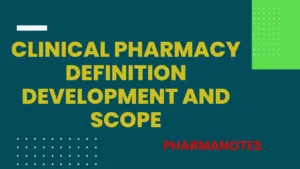Clinical Pharmacy Definition Development and Scope

Clinical Pharmacy Definition Development and Scope
Objective
After completion of this lecture, student will be able to:
• Discuss the functions of clinical pharmacy
• Discuss the need for clinical pharmacy in India
• Explain the qualification of personnel
Introduction to Clinical Pharmacy
• Clinical pharmacy may be defined as the science and practice of rationale use of medications, where the pharmacists are more oriented towards the patient care rationalizing medication therapy promoting health , wellness of people
• It is the modern and extended field of pharmacy
• “The discipline that embodies the application and development (by pharmacist) of scientific principles of pharmacology, toxicology, therapeutics, and clinical pharmacokinetics, pharmacoeconomics, pharmacogenomics and other allied sciences for the care of patients”
History
• Until the mid 1960’s; Traditional role
• The development of clinical pharmacy started in USA
• More clinically oriented curriculum were designed with the award of PharmD degree
• These developments influenced the practice of pharmacy in U.K
• Initially prescription and drug administration records were introduced followed by an increasing pharmacy practice in hospital wards
• Master degree programs in clinical pharmacy were introduced for first time in 1976
• The progress of clinical pharmacy development remained at low profile in the first decade after its birth in U.K
• However, Nuffield report in 1986 geared up the momentum for progression of clinical pharmacy
• Until today, the clinical pharmacy practice in Nepal is in embryonic stage
Origin of clinical pharmacy
• Clinical Pharmacy has its origin in the US in early 1960s
• Definition- Services provided by pharmacists in an attempt to promote rational drug use- safe, appropriate, cost effective
• Goal– To provide pharmaceutical care ( enhancing the care of individual patient)
Development of clinical pharmacy
• Pharmacy act (1948) – to control the standards of pharmacy profession
• D.Pharm (1953) – min qualification needed to practice pharmacy in India
• 1990 – Period of awakening, need for pharmacist to contribute to improved medication use in community
• 1991– Educational regulations to include hospital, clinical, community pharmacy & health education in D.Pharm curriculum
• 1996-97– First M.Pharm Pharmacy Practice program at J.S.S Mysore & Ooty
Need for Clinical Pharmacy in India
• Clinical Pharmacy Practice is concerned with the promotion of safe, effective & economical dug therapy
• ‘Pharmacy Practice’ a broader term– includes C.P & activities performed by pharmacist in hospital & community settings
• It includes- Dispensing, drug distribution. Drug information, health promotion, patient counseling, pharmacovigilance,
medication review
• Need of the hour in India
Need for Clinical Pharmacy in India
Pharmaceutical Industry
• Lack of fully fledged medical information departments by most pharmaceutical companies in India
• Presence of only technical info about drugs in package inserts
• Clinical pharmacist aims at providing unbiased drug information to doctors & patient counseling
Prescribers
• A busy practitioner may spend only around 5-10 min/per patient
• OPD in general hospitals are always overcrowded
• Lack of time may lead to DRP’s ( drug related problems )
• Risk of drug duplications
• Infectious diseases often treated empirically
• Definitive therapy after culture & sensitivity data not often practiced
• Wide spread antibiotic resistance
• Clinical pharmacist can help by providing information to deliver safer & more effective drug therapy
Government
• Drug policies mainly aimed at pharmaceutical industry rather than patients
• Price control, manufacture licensing have taken precedence over safe medication use
• ADR reporting systems not fully established
• Much can be done by government to establish PP in India
Patients
• Inability to read & write English used on medicine labels
• C.P’s can assist med. Compliance, provide counseling in local language, help resolve non- compliance
• PIL’s & advisory labels can be provided in local language
• Can advise on choosing most cost effective medicines in consultation with doctors
• Help minimize irrational & unnecessary drug use
Pharmacists
• Lack of services offered by pharmacists in medical stores such as patient counseling because of poor knowledge, lack of training, lack of confidence and no financial benefits
• Hospital pharmacist manage drug inventory, dispensing, record keeping
• Clinical pharmacist with appropriate training can help improve medication use by providing services such as drug therapy monitoring, patient counseling, DI services, ward round participation, ADR reporting & monitoring
Scope of Clinical Pharmacy in India
• Excellent relationship with the medical profession is needed to ensure progress of clinical pharmacy
• Rewarding career path with opportunities to contribute to improved medication use
• Employment in hospitals, teaching, drug information, pharmacovigilance, clinical research, medical information
Health Care System
Composed of physician (including other medical and dental staffs), pharmacist, nurse and other paramedics
Physician; diagnosis, prescription, monitoring, medical care
Pharmacist; prescription*, dispensing, counseling, monitoring, pharmaceutical care
Nurse; administering, monitoring, nursing care
Other paramedics; their own work
Load to physician & nurse; high due to the system of “physicians are all in all in hospital for the treatment of patient, with the help of nurse.”
Concept of normal public/patient; same
Perceptions of Pharmacists
How do others see us?
“They just count a few tablets”
“They just weigh and measure things”
“A bunch of shop-keepers”
“Not really health care practitioners – they’re businessmen”
“Tell me how and when to use the Medicine”
“Counter-prescribing”
“Do you need a degree to be a pharmacist?”
For practicing Clinical Pharmacy
• Competence of health care practitioners
-BPharm to Mpharm to PharmD*
-PharmD+ Pre-registration + registration
-Residency programs
-Continuing Professional Development
• Informed general public – increased expectation
Summary
• Pharmacy Practice’ a broader term- includes C.P & activities performed by pharmacist in hospital & community settings
• Services provided by pharmacists in an attempt to promote rational drug use- safe, appropriate, cost effective
• Clinical pharmacist with appropriate training can help improve medication use by providing various services
For Clinical Pharmacy Definition Development and Scope PDF Notes Click on the Download Button
